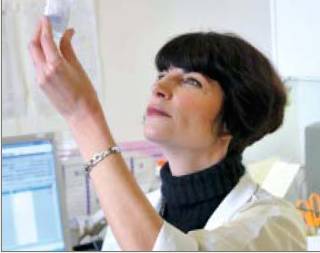
Karen Meir, Hadassah Medical Center pathologist, notes that pathology “appealed to me because, medically, you need to know a little bit about every area, and because of the teamwork involved.”
Dr. Meir, who attended medical school in Toronto, Canada, moved to Israel as a young bride at age 25. She met her Israeli husband while in high school in Ottawa, where she grew up. His father was a diplomat, posted in the Israeli Embassy there. When he went back to Israel to serve in the Israel Defense Forces and then on to law school, she visited him often. By 1996, they were married and they now have two sons.
While taking a one-year internship at another Jerusalem hospital, Dr. Meir took an elective course in pathology at the Hadassah Medical Center. “When I applied for a residency,” she relates, “I knew the Hadassah pathology team was the one I wanted to work with because the physicians were very bright, collegial, cooperative, committed, and simply very nice people.”
Having served a five-year residency at Hadassah, Dr. Meir is now one of the Medical Center’s senior pathologists. “Each of us in the department is something of a jack-of-all-trades,” she says. “But we’ve each also developed our own areas of expertise.” Dr. Meir’s specialty is embryonic, fetal, and placental material. Her work involves examining aborted fetuses to see what went wrong, whether this scenario is likely to repeat itself, and what can be done to prevent it.
In 2004, Dr. Meir returned to Canada to take a fellowship in this growing area of pathology. In the meantime, the Hadassah Medical Center decided to set up Israel’s National Tumor Tissue Bank. The goal, Dr. Meir explains, “is to preserve and store tissue from malignant tumors, so we can study them and come up with predictive tests and markers.” This, in turn, will help in the development of specific, tailor-made therapies.
Dr. Meir was asked to help establish the Tissue Bank at Hadassah upon her return from Vancouver. In 2006, Dr. Meir began the process. First, she established technical protocols, developing the systems to obtain, freeze, and store the tissue. “The starting-point is the patient,” she relates. “Without their informed consent, we can do nothing.”
Now in its start-up phase, the Bank is targeting patients with malignancies of the breast, lung, pancreas, and colon. Other types of cancer will be added later. Patients are asked for permission to take a sample of their tumor and normal tissues, which are excised by the surgeon, and to store these tissues while following the patient’s state of disease over time. Some 95 percent of those asked agree.
While there are tumor tissue banks abroad, this is the first one in Israel, Dr. Meir reports, noting that Israel’s unique demographics enables her to make a special contribution to knowledge in this field. “In a small geographical space,” she elaborates, “we have an amazing mix of genetic populations, in both the Jewish and the Arab communities. For the purpose of molecular comparisons, this is a treasure trove.”
